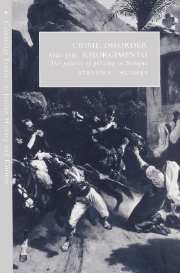Book contents
- Frontmatter
- Contents
- List of illustrations and tables
- Acknowledgments
- List of abbreviations and note on footnotes
- Map 1 Primary political divisions of the Papal States in 1842
- Map 2 Legation of Bologna 1821
- Introduction
- 1 Setting the stage: Bologna, the ancien régime, and Napoleon
- 2 Consalvi's cops
- 3 Functions and failures (1815–1831)
- 4 Public order and the revolution of 1831
- 5 Reform and failure (1832–1847)
- 6 Reform and revolution (1847–1849)
- 7 The search for stability and the turn to Piedmont (1849–1859)
- 8 Epilogue: Risorgimento, freedom, and repression
- 9 Conclusion
- Appendix A Personnel plans of Bologna's Provincial Police, 1816–1863
- Appendix B The pattern of crime in Bologna, 1819–1846
- Index
- Frontmatter
- Contents
- List of illustrations and tables
- Acknowledgments
- List of abbreviations and note on footnotes
- Map 1 Primary political divisions of the Papal States in 1842
- Map 2 Legation of Bologna 1821
- Introduction
- 1 Setting the stage: Bologna, the ancien régime, and Napoleon
- 2 Consalvi's cops
- 3 Functions and failures (1815–1831)
- 4 Public order and the revolution of 1831
- 5 Reform and failure (1832–1847)
- 6 Reform and revolution (1847–1849)
- 7 The search for stability and the turn to Piedmont (1849–1859)
- 8 Epilogue: Risorgimento, freedom, and repression
- 9 Conclusion
- Appendix A Personnel plans of Bologna's Provincial Police, 1816–1863
- Appendix B The pattern of crime in Bologna, 1819–1846
- Index
Summary
By now it should be obvious, if not monotonous, that the papal police, in their form, functions, and efficiency, played a major role in the political life of Bologna during the Risorgimento. In a variety of ways, the history of Bologna's police confirms the recent, but generally accepted, belief that the police system of any given society is determined as much by political and social influences as by juridical conceptions of deviance and criminality. These influences are especially prominent in Bologna's case because the police were imposed on the province, first by Napoleon and then by Consalvi, as part of a general political settlement that destroyed traditional patterns of privilege and power. By definition, continental police had myriad administrative functions and extensive political responsibilities that placed them squarely on the line between sovereign and subjects. Consalvi thus simultaneously saw the police as a vital organ of a centralized bureaucracy, as a force for political conformity, and as a means of combatting crime: roles that constantly intermingled and occasionally clashed within his general conception of government. The Carabinieri as the arma politica, the police as the agenti politici, and the weekly police report as the bollettino politico all symbolized the ultimate identity between the modern administrative monarchy and the enforcers of its laws.
For Italy this was a novelty introduced by Napoleon; and the history of Bologna's police justly points out the enormous impact of his intervention on the peninsula.
- Type
- Chapter
- Information
- Crime, Disorder, and the RisorgimentoThe Politics of Policing in Bologna, pp. 255 - 267Publisher: Cambridge University PressPrint publication year: 1994



